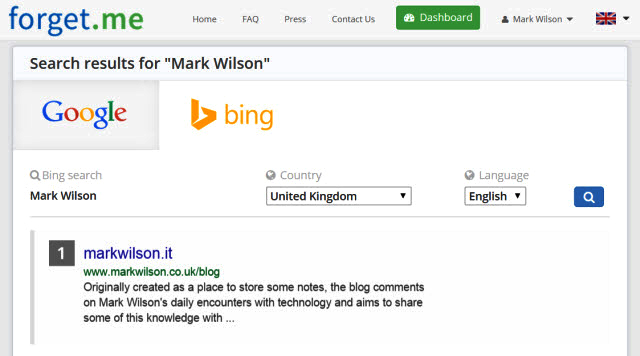
Chrome's All Seeing Eye searches the text of every page you’ve visited
You’ve been online for hours, Chrome windows and tabs scattered everywhere, and now you need to revisit a particular page. Which would be fine, except you can’t remember which one it was, and the standard web history -- just titles and URLs -- doesn’t help at all.
Maybe you should have installed All Seeing Eye, a Chrome extension which takes a snapshot of every page you visit, indexes its text, and makes this freely searchable whenever you like.

Google Chrome 64-bit Beta arrives, edges closer to final Windows release
Google has moved its dedicated 64-bit Windows build of Chrome one step closer to its final release with the launch of Google Chrome 37.0 Beta (64-bit). The new release requires Windows 7 64-bit or later to run.
The new build, which is also available in 64-bit form for Linux, moves to the beta channel, but despite media speculation, users should not assume a final release is just a few weeks away – it could yet be months before Google deems the build is stable enough for general consumption.

Pale Moon resolves rendering performance issues, among other tweaks and fixes
Moonchild Productions has released a minor update to its Firefox browser variant for Windows with the release of Pale Moon 24.7 and Pale Moon x64 24.7.
Version 24.7 is primarily a bug fix release, and also includes the latest security fixes recently incorporated into the main Firefox build.

Wilson's Weekend Whine: slow connections are dividing the web -- and making me mad
The inspiration for this weekend's whine, along with the reason for its slight delay are one and the same thing. An appallingly slow (often non-existent) internet connection. Well, actually it's a combination of things, a slow internet connection being just one of them. Most people -- myself included in the past -- don't give a second thought to living online. Web pages are there ready be accessed on demand. Movies are just waiting to stream. Facebook and Twitter posts stream by. And so on. At least that's how it should be. If you live out in the sticks, it's a very different story -- and it stops me from banging about Edward Snowden and the NSA.
Look at the headlines and you’d be forgiven for thinking that everyone in the "developed world" is working with a blisteringly fast connection. Forget cables, we just have our brains connected directly to the internet. But we don’t. Here in the UK, there is a very noticeable digital divide, and I know it's a similar story in many other parts of the world. I've been fairly lucky in the past. Moving house at the turn of the millennium happily coincided with the arrival of broadband in the area. Hooray! 4Mbps of downstream -- more than acceptable nearly 15 years ago. A house move later, and things jumped to 8Mbps.

Forget.me now handles 'right to be forgotten' requests for Bing as well as Google
Back in May, the EU Court of Justice ruled that people have a "right to be forgotten" from search results. Google fairly quickly set up an online form to allow complainants to put forward their case for censoring their appearance in results. It didn’t take long for Microsoft to follow suit, and Bing users were soon afforded the same option.
Forget.me was one service that offered to take care of Google removal requests for people, and at the time CEO Bertrand Girin promised that "if Bing and Yahoo get their Right to be Forgotten forms in order, we’ll be able to provide you with the possibility of submitting your URL to all three search engines at the same time." For Microsoft, that day has come.

Are you Bing-curious? Microsoft's search engine comes to new tabs in Google Chrome
Bing is a wonderful search engine. My love for it is hardly a secret, as I declared my affection earlier today. However, while Internet Explorer is getting better all the time, Chrome is still my preferred browser on Windows, Linux and OS X. Unfortunately, using Bing as the default search engine on Chrome just felt wrong. I pictured Google employees spying on my web activity and shaking their heads in disappointment at my horrible crime.
Of course, that is not really happening (I hope), but still Bing on Chrome felt out of place and third-rate in comparison to Google. Today, this changes as Bing comes to new tabs in the Chrome browser.

Do Not Track is bolstered by EFF's Privacy Badger extension
Online security and privacy are hotter topics than ever. Just this weekend, Edward Snowden made an appearance at the Hope X 2014 hacker event, and called for those in attendance to help make encryption tools easier to use. Another fierce advocate of online privacy is the EFF (Electronic Frontier Foundation), and today the group released a beta version of Privacy Badger, a beautifully named extension for Chrome and Firefox designed to stop a number of tracking techniques used online. The idea of tracking cookies is something that will be familiar to most, but tracking takes many forms, including advertising and social media. Privacy Badger aims to block this tracking.
Peter Eckersley, EFF Technology Projects Director, said: "Widgets that say 'Like this page on Facebook' or 'Tweet this' often allow those companies to see what webpages you are visiting, even if you never click the widget's button. The Privacy Badger alpha would detect that, and block those widgets outright. But now Privacy Badger's beta version has gotten smarter: it can block the tracking while still giving you the option to see and click on those buttons if you so choose".

BitTorrent looking for testers for mysterious new product
BitTorrent has been branching out over the past year, introducing new products such as Sync and Chat, both being encrypted and with a promise that user data is protected. Now the organization is looking to test a new product, but information is scant.
BitTorrent posted a short and mysterious blog post asking for testers to try out a new product, which it claims is for web browsers.

Snowden: Facebook is allowing the government to see your messages
In a lengthy interview with the Guardian, NSA whistle blower Edward Snowden spoke with editor Alan Rusbridger about his extraordinary rise to infamy. Currently in exile in Russia, he talked about how he disseminated documents about the activities of the NSA to numerous countries: "Once you start splitting them over jurisdictions and things like that it becomes much more difficult to subvert their intentions. Nobody could stop it". He remains defiant. He may be an outlaw but "it’s been vindicating to see the reaction from lawmakers, judges, public bodies around the world, civil liberties activists who have said it’s true that we have a right to at least know the broad outlines of what our government’s doing in our name and what it’s doing against us".
He explains how during his time working as an NSA analyst, he learned about previous surveillance programs run under George W Bush. Programs that were deemed unconstitutional and, having been closed, forced the US government to assume new executive powers that were then used "against the citizenry of its own country". For Snowden the power of the state is worrying:
Google Chrome tweaks notification popups, adds crash recovery browser bubble
Google has unveiled Chrome 36 FINAL for Windows, Mac and Linux, with Chrome for Android 36 rolling out shortly. The desktop update adds a couple of user interface tweaks under the label "rich notifications improvements".
It also updates the incognito browsing page, adds a browser crash recovery bubble that could help prevent data loss and extends the Chrome App Launcher to Linux, plus adds various under-the-hood tweaks.

View all your Firefox tabs at once with Tile Tabs
Firefox’s tabs are normally an easy and convenient way to work online, neatly organising your open sites into separate, isolated views.
There may still be times when you need to view two or more tabs at the same time, though -- and that’s where Tile Tabs can help, instantly organizing your chosen Firefox tabs into a single tiled window.

NSA under the microscope -- agency releases "transparency" report
NSA, Snowden, spying, yadda, yadda, yadda. This story is old, I know, but it goes on. The activities of the NSA and other government agencies have forced the online world to look very closely at how its data is being used, and how the companies handling it operate. Just about every online company worth its salt has gone out of its way to bemoan the NSA, their need to comply with data requests from the agency, and their inability to reveal everything they want to about what the NSA is asking about.
We have seen "transparency reports" from Google, Microsoft, LinkedIn and numerous other companies. But as suggested by my use of quotes, and as alluded to in the opening paragraph, there have been (severe) limits to the levels of transparency we have seen. "Quite opaque" might be a better description. Still, with the world and its dog falling over one another to release the most details, most comprehensive, and most self-congratulatory report, we probably should have predicted that pressure on the NSA would reach a point at which it felt forced to show its own hand. That time has come. The microscope has been turned around, and the security agency is now laying bare its own facts and figures.

The most popular stories on BetaNews this past week: June 22 -- 28
The battle for dominance between Microsoft and Google continued, with Microsoft offering a huge storage boost for Office 365 and OneDrive users. This was quickly trumped by Google later in the week at 1/0 2014, when the company announced unlimited storage for Google Drive for Work users. Microsoft is basking in the glory of being heralded as cooler than Apple by Joe -- and stunts like offering cashback deals to sway MacBook Air owners into switching into Surface Pro 3 certainly helps. Microsoft opened a new store on Long Island, while Google branched out into new territory with a trial run of a new domain registration service. Microsoft also ventured into new waters with its first Android smartphone, the Nokia X2.
In something of an interesting twist, Microsoft opted to use Opera Mobile as the default web browser. Opera is also returning to Linux after the surprise release of Opera 24 Developer. Linux Mint 17 "Qiana" KDE was also released. Linux also managed to hit the headlines for facilitating the hacking of Google's Nest thermstats. If this hasn’t put you off, Logitech added support to its Harmony remotes.

Sundance web browser lets Windows users perform advanced web searches easily
More than a decade into the browser wars, and they show no signs of abating. But while the behemoths of Microsoft, Google and Mozilla battle it out in the heavens for market share, closer to earth there’s still room for niche web browsers to make their mark.
One such browser is Sundance 4.0, which aims to carve itself a niche by providing easy access to advanced search tools, direct from the browser’s main interface.

Opera decides to support Linux (again)
Even though it has gone to the effort of switching to another rendering engine to reach more users, Norwegian software company Opera, in mid-2013, ceased to further update the Linux version of its browser, leaving users without new features, bug fixes and security patches. In the meantime, Opera's main competitors, like Google Chrome and Mozilla Firefox, continued to give them the level of support that they deserve.
Now, after close to a one-year hiatus, the company behind the well-known browser announces the availability of Opera Developer 24 for Linux (and, of course, OS X and Windows). It is an unexpected release, and also great news for those hoping to witness the browser's triumphant return in the land of the open-source kernel.
